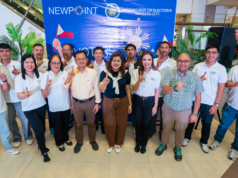(Concluding part of yesterday’s column that first appeared as commentary in Sun-Star Pampanga on February 21, 2004 and reprinted here abridged in keeping with the celebration of EDSA 1.)
INDEED, WE are the very people the philosopher George Santayana warned against in The Life of Reason: “Those who cannot remember the past are condemned to repeat it.”
In the 1970s, a great political mind distilled Philippine politics thus: “Personalist, populist and individualist.” Then, he went on to arrogate unto himself all the powers that can be had and more – he elevated himself to the pantheon of the gods, assuming the mythic Malakas of Philippine folklore, with, naturally, the beautiful First Lady as his Maganda.
But of course, dummy, I am speaking of Ferdinand Edralin Marcos.
A keen student of history, Marcos took unto his public persona semblances of the charismatic leaders of the ages: his World War II exploits – later proven false – invoked Napoleon Bonaparte, if not Julius Caesar; his political philosophies gave him the aura of the Borgia and Medici clients of Machiavelli; his vision of his New Society paralleled Franklin Delano Roosevelt’s New Deal; his patronage of the arts, that of Frederick the Great of Prussia.
Marcos even exceeded himself in self-cultivating an image of being his country’s hero-in-history in the moulds of Napoleon of France, Bolivar of Latin America, Lincoln of the United States, Garibaldi of Italy, Lenin of the Soviet Union, Ataturk of Turkey, Mao of China and Castro of Cuba.
A wee shot of divine rights, Marcos took upon himself a Messianic and Mosaic mission for the Philippines: save the country and its democratic institutions from anarchy, lead the people to the promised prosperity. Truly, what other Philippine leader possessed “charisma” greater than Marcos?
Yet, where did Marcos take the country?
With EDSA 1, the Cory Aquino Magic swept the land. Any hand raised by the sainted Cory automatically won in the 1987 and 1988 elections. In Cory, pure “charisma” was at work.
Party politics
THE reinvention of Philippine democracy mandate a multi-party system aimed to put a definitive end to the Marcos cult and the political stranglehold of his monolithic Kilusan Bagong Lipunan (KBL), and hoped that politics based on platform rather than personality would at last prevail. Did it?
In 1991, Fidel V. Ramos lost the Laban ng Demokratikong Pilipino (LDP) convention to Ramon Mitra and promptly founded lakas-Tao, later evolving to Lakas-National Union of Christian Democrats (Lakas-NUCD). With Ramos’ election, LDP ceded its pre-eminence to Lakas-NUCD.
In 1998, Estrada had his Partido ng Masang Pilipino (PMP) but soared on the wings of the Nationalist People’s Coalition (NPC), which subsequently became the party of choice in the country. With Estrada disgraced in 2001, Lakas-NUCD evolving further into Lakas-CMD (for Christian-Muslim Democrats) came back to the political centerstage.
(With Benigno Aquino III’s victory in 2010, his Liberal Party comes to pre-eminence.)
So we now have party politics at work? Not by any means.
The party does not exist by itself. The party is predicated not on a platform of government but on a personality. The party is a simple extension of a person. Thus, KBL was Marcos. Thus, Lakas is Ramos; NPC, Danding Cojuangco; PMP, Erap; LDP, Angara or Aquino, depending on one’s personal affiliation.
Of this, we are reminded of Quezon: “My loyalty to my party ends where my loyalty to my country begins.”
In the current scheme of things political, that Quezonian ultra-patriotism has been corrupted to: “My loyalty to my party ends where my loyalty to my personal interests begins.” Thus, the proliferation of political butterflies and – to use the current mintage – political prostitutes.
And then, what about the party list system?
There are as many parties as there are individuals who conceive of them. What was primarily intended to give equal representation to the marginalized sectors has fallen to the hands of big power brokers and the traditional political cliques themselves. Once more, we have abused and misused this democratic instrument.
Party politics is a sham. Principled politics is an oxymoron, a contradiction in terms. The politics of personality rules and reigns. What democracy do we speak of then in this country? This is demo-crazy.
Pity the next generation.
History shows that a people in desperation look up to the Heavens or to the mountains for their salvation: the Chinese looked up to Mount Tai and saw Mao; the Cubans to the Sierra Maestra and got Castro with Che Guevara; and in our Judeo-Christian tradition, the Israelites to Mount Sinai and found Yahweh,
So to the Heavens we look up and pray. That God, in his mercy, bestow upon this blighted land the leader gifted with the grace to subsume his own interests to those of his people and take this nation to its own promised land.
A charismatic leader – in the truest sense of the word – do indeed we need.
But is there one out there in the field?
AND SO 2010 came to pass, lo and behold, P-Noy in Malacañang driving around favorite nephew Joshua in his second-hand but still-over-P5-million Porsche.
Oh, God!
INDEED, WE are the very people the philosopher George Santayana warned against in The Life of Reason: “Those who cannot remember the past are condemned to repeat it.”
In the 1970s, a great political mind distilled Philippine politics thus: “Personalist, populist and individualist.” Then, he went on to arrogate unto himself all the powers that can be had and more – he elevated himself to the pantheon of the gods, assuming the mythic Malakas of Philippine folklore, with, naturally, the beautiful First Lady as his Maganda.
But of course, dummy, I am speaking of Ferdinand Edralin Marcos.
A keen student of history, Marcos took unto his public persona semblances of the charismatic leaders of the ages: his World War II exploits – later proven false – invoked Napoleon Bonaparte, if not Julius Caesar; his political philosophies gave him the aura of the Borgia and Medici clients of Machiavelli; his vision of his New Society paralleled Franklin Delano Roosevelt’s New Deal; his patronage of the arts, that of Frederick the Great of Prussia.
Marcos even exceeded himself in self-cultivating an image of being his country’s hero-in-history in the moulds of Napoleon of France, Bolivar of Latin America, Lincoln of the United States, Garibaldi of Italy, Lenin of the Soviet Union, Ataturk of Turkey, Mao of China and Castro of Cuba.
A wee shot of divine rights, Marcos took upon himself a Messianic and Mosaic mission for the Philippines: save the country and its democratic institutions from anarchy, lead the people to the promised prosperity. Truly, what other Philippine leader possessed “charisma” greater than Marcos?
Yet, where did Marcos take the country?
With EDSA 1, the Cory Aquino Magic swept the land. Any hand raised by the sainted Cory automatically won in the 1987 and 1988 elections. In Cory, pure “charisma” was at work.
Party politics
THE reinvention of Philippine democracy mandate a multi-party system aimed to put a definitive end to the Marcos cult and the political stranglehold of his monolithic Kilusan Bagong Lipunan (KBL), and hoped that politics based on platform rather than personality would at last prevail. Did it?
In 1991, Fidel V. Ramos lost the Laban ng Demokratikong Pilipino (LDP) convention to Ramon Mitra and promptly founded lakas-Tao, later evolving to Lakas-National Union of Christian Democrats (Lakas-NUCD). With Ramos’ election, LDP ceded its pre-eminence to Lakas-NUCD.
In 1998, Estrada had his Partido ng Masang Pilipino (PMP) but soared on the wings of the Nationalist People’s Coalition (NPC), which subsequently became the party of choice in the country. With Estrada disgraced in 2001, Lakas-NUCD evolving further into Lakas-CMD (for Christian-Muslim Democrats) came back to the political centerstage.
(With Benigno Aquino III’s victory in 2010, his Liberal Party comes to pre-eminence.)
So we now have party politics at work? Not by any means.
The party does not exist by itself. The party is predicated not on a platform of government but on a personality. The party is a simple extension of a person. Thus, KBL was Marcos. Thus, Lakas is Ramos; NPC, Danding Cojuangco; PMP, Erap; LDP, Angara or Aquino, depending on one’s personal affiliation.
Of this, we are reminded of Quezon: “My loyalty to my party ends where my loyalty to my country begins.”
In the current scheme of things political, that Quezonian ultra-patriotism has been corrupted to: “My loyalty to my party ends where my loyalty to my personal interests begins.” Thus, the proliferation of political butterflies and – to use the current mintage – political prostitutes.
And then, what about the party list system?
There are as many parties as there are individuals who conceive of them. What was primarily intended to give equal representation to the marginalized sectors has fallen to the hands of big power brokers and the traditional political cliques themselves. Once more, we have abused and misused this democratic instrument.
Party politics is a sham. Principled politics is an oxymoron, a contradiction in terms. The politics of personality rules and reigns. What democracy do we speak of then in this country? This is demo-crazy.
Pity the next generation.
History shows that a people in desperation look up to the Heavens or to the mountains for their salvation: the Chinese looked up to Mount Tai and saw Mao; the Cubans to the Sierra Maestra and got Castro with Che Guevara; and in our Judeo-Christian tradition, the Israelites to Mount Sinai and found Yahweh,
So to the Heavens we look up and pray. That God, in his mercy, bestow upon this blighted land the leader gifted with the grace to subsume his own interests to those of his people and take this nation to its own promised land.
A charismatic leader – in the truest sense of the word – do indeed we need.
But is there one out there in the field?
AND SO 2010 came to pass, lo and behold, P-Noy in Malacañang driving around favorite nephew Joshua in his second-hand but still-over-P5-million Porsche.
Oh, God!




